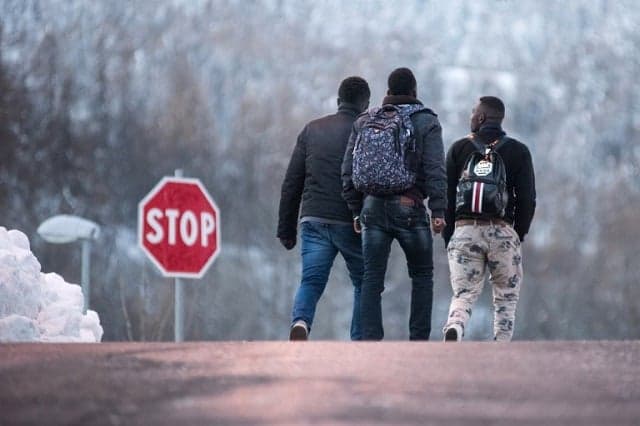Immigration in Italy: Fact-checking five common myths and assumptions

A right-wing coalition shepherded by ex-prime minister Silvio Berlusconi is capitalizing on anti-immigrant feeling in the lead up to Italy's general elections on March 4th.
Here are five sets of facts about common complaints, misconceptions and other aspects of immigration in Italy:
1. 'Too many of them'
Italy's national statistics institute Istat says that there are five million foreigners legally resident in Italy. That's 8.3 percent of the country's population of 60.5 million.
More than 690,000 migrants, most from Sub-Saharan Africa, have arrived by boat from Libya since 2013. Migration study foundation ISMU estimates that around 500,000 are living in the country illegally -- 0.9 percent of the population.
-
'We're scared of immigration, not Europe,' say Italian voters
-
How refugees brought this dying Italian village back to life
-
Italy must act on migration to fight populism: foreign minister
2. 'They cost us money'
Government figures put the cost in 2017 of migrants arriving via Libya at more than 4.2 billion euros, of which 65 percent was spent on taking care of asylum seekers during their application process.
According to a study by the Idos Institute, overall immigrants bring in between 2.1 and 2.8 billion euros more than they cost the state.
3. 'They laze about all day'
"People go crazy there. There are many young people whose brains just go numb after a few months," says Moussa Bamba, a 32-year-old Ivorian. He spent several months crammed in a crowded reception centre near Venice with 1,400 other migrants.

People sit outside a migrant assistance centre in Ventimiglia. Photo: Marco Bertorello/AFP
The Conetta facility was dubbed a "human warehouse" by local mayor Alberto Panfilio. While some facilities offer activities and support, others are accused of scrimping on costs while immigrants wait for up to two years on a decision on their status.
4. 'They bring crime'
Italy's Interior Ministry says the crime rate has dropped by 8.3 percent the last ten years, despite the fact that the number of foreigners in the country has increased from three to five million.
Figures presented by the ministry showed that in 2017 murders dropped by nearly 12 percent, robberies by 11 percent and burglaries by nine percent.
5. 'It's an invasion'
A controversial agreement signed by Rome with the Libyan authorities and militias last summer reduced arrivals by 70 percent. The government also oversaw a 12 percent increase in expulsions last year, from 5,817 in 2016 to 6,514.
Comments
See Also
Here are five sets of facts about common complaints, misconceptions and other aspects of immigration in Italy:
1. 'Too many of them'
Italy's national statistics institute Istat says that there are five million foreigners legally resident in Italy. That's 8.3 percent of the country's population of 60.5 million.
More than 690,000 migrants, most from Sub-Saharan Africa, have arrived by boat from Libya since 2013. Migration study foundation ISMU estimates that around 500,000 are living in the country illegally -- 0.9 percent of the population.
- 'We're scared of immigration, not Europe,' say Italian voters
- How refugees brought this dying Italian village back to life
- Italy must act on migration to fight populism: foreign minister
2. 'They cost us money'
Government figures put the cost in 2017 of migrants arriving via Libya at more than 4.2 billion euros, of which 65 percent was spent on taking care of asylum seekers during their application process.
According to a study by the Idos Institute, overall immigrants bring in between 2.1 and 2.8 billion euros more than they cost the state.
3. 'They laze about all day'
"People go crazy there. There are many young people whose brains just go numb after a few months," says Moussa Bamba, a 32-year-old Ivorian. He spent several months crammed in a crowded reception centre near Venice with 1,400 other migrants.

People sit outside a migrant assistance centre in Ventimiglia. Photo: Marco Bertorello/AFP
The Conetta facility was dubbed a "human warehouse" by local mayor Alberto Panfilio. While some facilities offer activities and support, others are accused of scrimping on costs while immigrants wait for up to two years on a decision on their status.
4. 'They bring crime'
Italy's Interior Ministry says the crime rate has dropped by 8.3 percent the last ten years, despite the fact that the number of foreigners in the country has increased from three to five million.
Figures presented by the ministry showed that in 2017 murders dropped by nearly 12 percent, robberies by 11 percent and burglaries by nine percent.
5. 'It's an invasion'
A controversial agreement signed by Rome with the Libyan authorities and militias last summer reduced arrivals by 70 percent. The government also oversaw a 12 percent increase in expulsions last year, from 5,817 in 2016 to 6,514.
Join the conversation in our comments section below. Share your own views and experience and if you have a question or suggestion for our journalists then email us at [email protected].
Please keep comments civil, constructive and on topic – and make sure to read our terms of use before getting involved.
Please log in here to leave a comment.